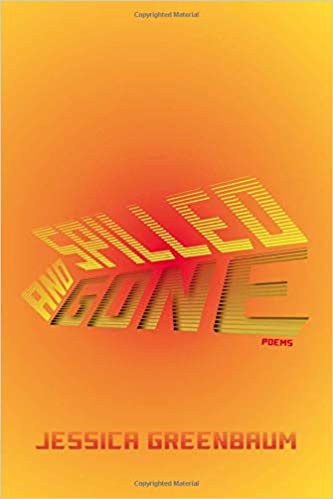
Jessica Greenbaum. Spilled and Gone. University of Pittsburgh Press, 2019. $17.00. 70 pgs.
Jessica Greenbaum entices you into her poems through her titles—“I Love You More Than All the Windows in New York City,” “Emily Dickinson’s Herbarium at the Morgan Library,” “The Trees Having Tea above Me,” “Ode to Polish Forests”—and then she rewards you with the imagery, inventively figurative language, and narratives that follow. The poems in Spilled and Gone, her third collection, are structured primarily of comparatively long lines organized into single stanzas, though interspersed among these poems is a series of odes, most often praising common items like a potato masher or serrated knife.
These odes are structured quite differently, still single stanzas but with lines that often consist of only two or three stanzas. These odes provide resting places throughout the collection for both the reader’s eye and the reader’s emotional stamina, for though these poems are rewarding and memorable, and though in many of them the speaker achieves some kind of acceptance by the end, the journey is often troubling, as many of our journeys are.
In “My Eden Story,” for example, the speaker tells the story of her ancestors’ immigration to the United States. Though “Eden” often evokes paradise, life before the Fall, when human beings lived without effort or unhappiness, the Eden here is the one Adam and Eve were required to leave behind. The poem begins with these lines:
My great-grandparents were hounded out
of their native lands; no streets were named after them
in those lost-named Slavic towns where they left everything,
nor in Argentine where the paternal pair tarried
for the birth of the baby who became my grandmother,
nor where they landed in Manhattan…
The phrase “hounded out” works perfectly here—readers know immediately why these people left Europe; Greenbaum doesn’t need to state or even allude very directly to the horrific events that followed their departure. Eventually, the family ends up in Monticello, NY, a resort town in the Catskills when the Catskills were known for their Jewish resorts. The poem focuses on a couple of significant events, her grandparents’ wedding, her great uncle digging a lake with a backhoe, in order to demonstrate the passing of time. Midway through the poem, the focus shifts from ancestral history to the speaker’s own life: “That’s where I came in,” she says.
The poem describes the girl’s many activities at this camp in Monticello, and in her memory, these years were comforting and carefree. As a girl born in the United States after the second World War, she clearly had no memories of the vicious anti-Semitism her great-grandparents had experienced; perhaps she had no knowledge of it either. The poem could end here, with the child’s innocence and the suggestion that life can get easier. With the escape from Manhattan to the rural Catskills, perhaps the family even returned to a bit of Eden. Once a people falls into the knowledge of evil, however, no return to Eden is ever possible. The poem doesn’t end here.
It ends much more subtly:
…Sometimes I went spying
for salamanders, lifting up ferns and stones after the rain,
because this was one way the children recognized
what life meant. Flushed from their own home,
the tiny-footed creatures flashed orange on green moss
and I see them as my first neon sign for happiness,
which is why I hope I let them go and live in peace.
This ending does gesture back toward Eden, but these salamanders are “flushed from” rather than “hounded out” of their homes. Recognizing children’s’ occasional attraction to cruelty and their naïve desire to capture wild creatures to keep as their own, the speaker doesn’t exonerate herself, but she doesn’t falsely attribute either of these characteristics to herself either. She leaves the poem and the memory ambiguous. She is able to choose “happiness” and “peace” as the last words in the final two lines of the poem while also signaling that these enviable states remain uncertain.
Despite the length of the poem—50 lines—that last line arrives suddenly. The effect of the last line depends in part on its suddenness, and also upon the choice of thirteen monosyllabic words, the last ten of them iambic. Greenbaum’s skill with craft results in poems like this one, written effectively yet without drawing undue attention to the craft, seeming, in fact, to rely on absolutely ordinary language. The lines are fairly consistent in length, as the quotations above demonstrate, and more often enjambed than end-stopped. Because the lines are comparatively long, Greenbaum can both rely on grammatical units in choosing line breaks and also include frequent caesuras within the middle of the lines, affecting rhythm as well as meaning. For example, in the quotation above, the lines all end strongly, but the one that contains a period three syllables in, and four lines from the end of the poem, is most remarkable: “what life meant. Flushed from their own home,…” The period functions nearly as a thematic colon; life means being flushed from your home. The child isn’t thinking about pogroms or death camps, but the poet is, and so is the reader. Greenbaum’s ability to address such a subject without ever specifically mentioning it is impressive.
I found myself lingering over many of the poems in Spilled and Gone. Every time I’ve returned to it, looking for a specific poem, I’ve read others instead, drawn in by the voice and then ruminating over the insights. Greenbaum pays attention to her world and teaches her readers how to pay attention too.
